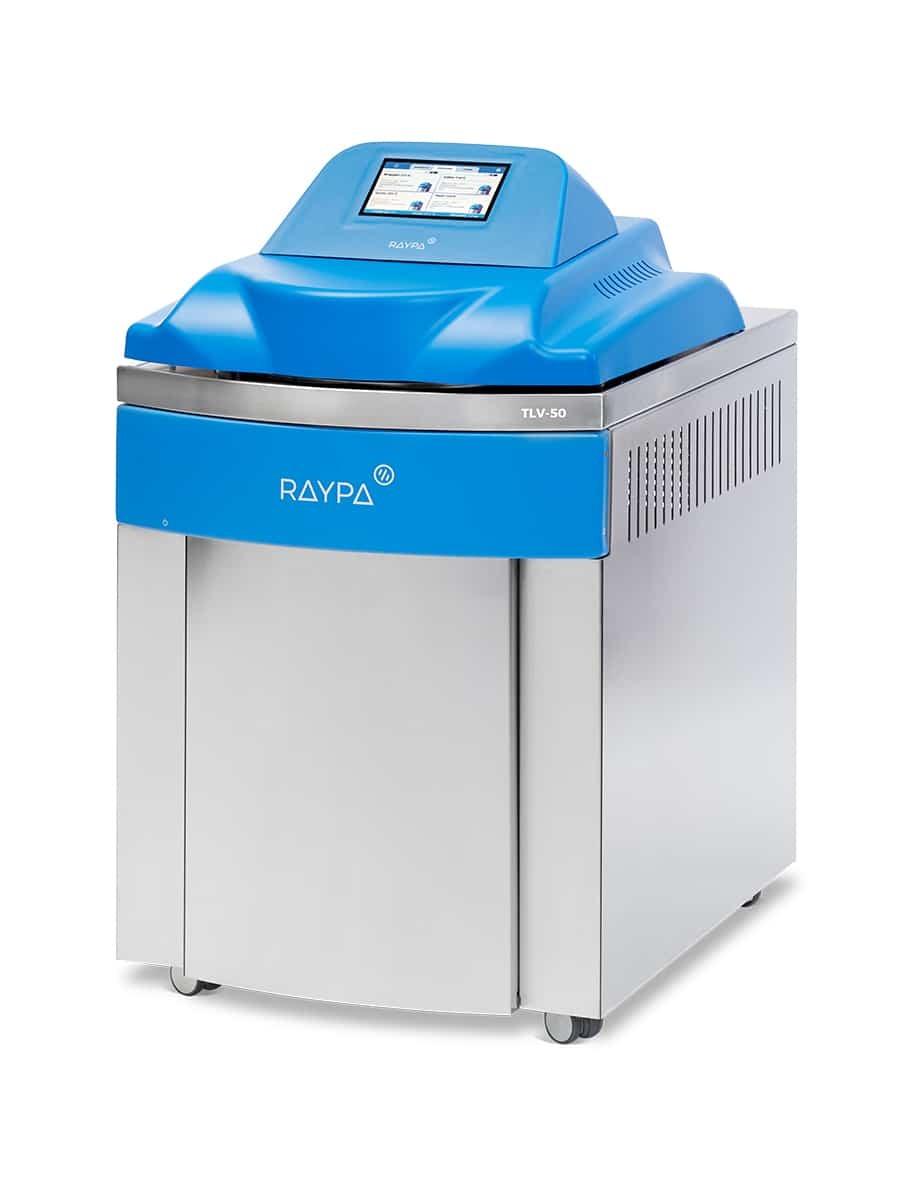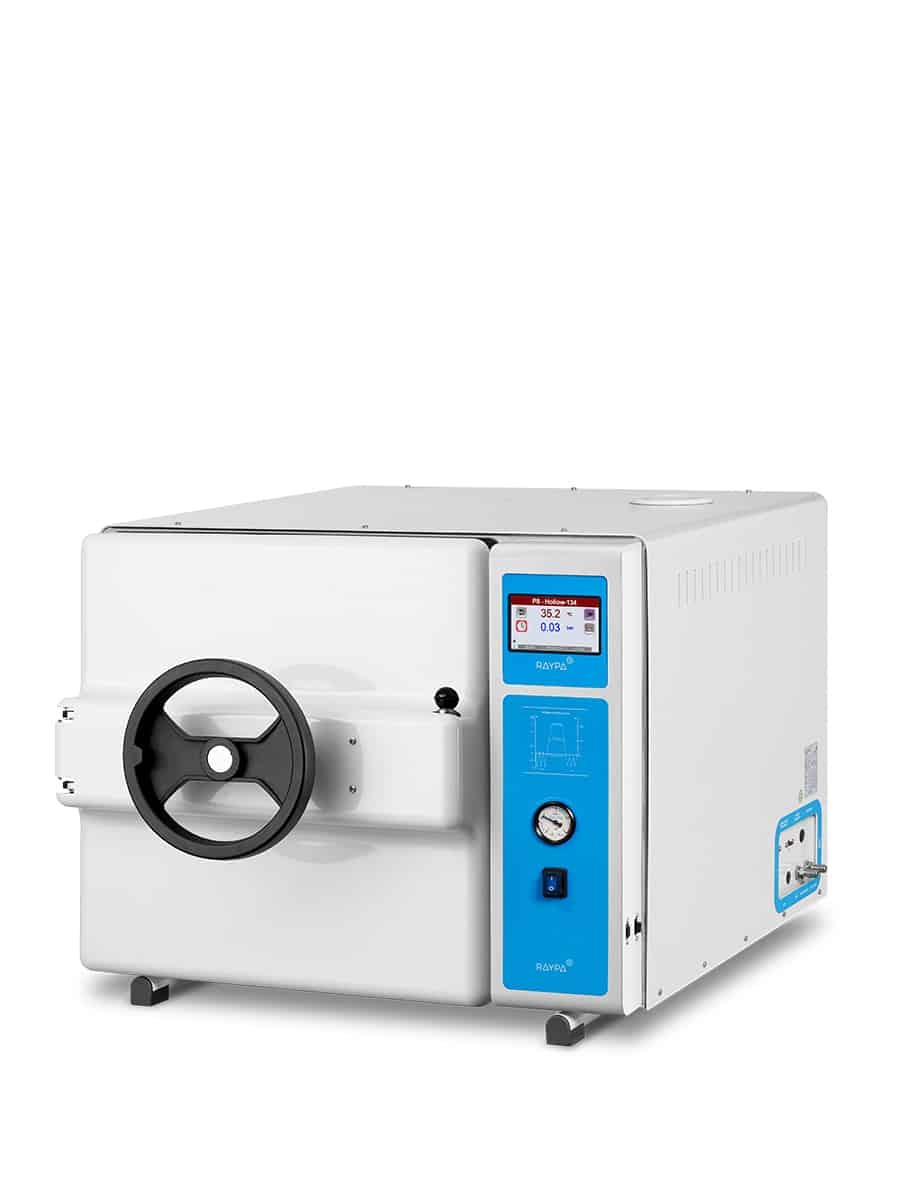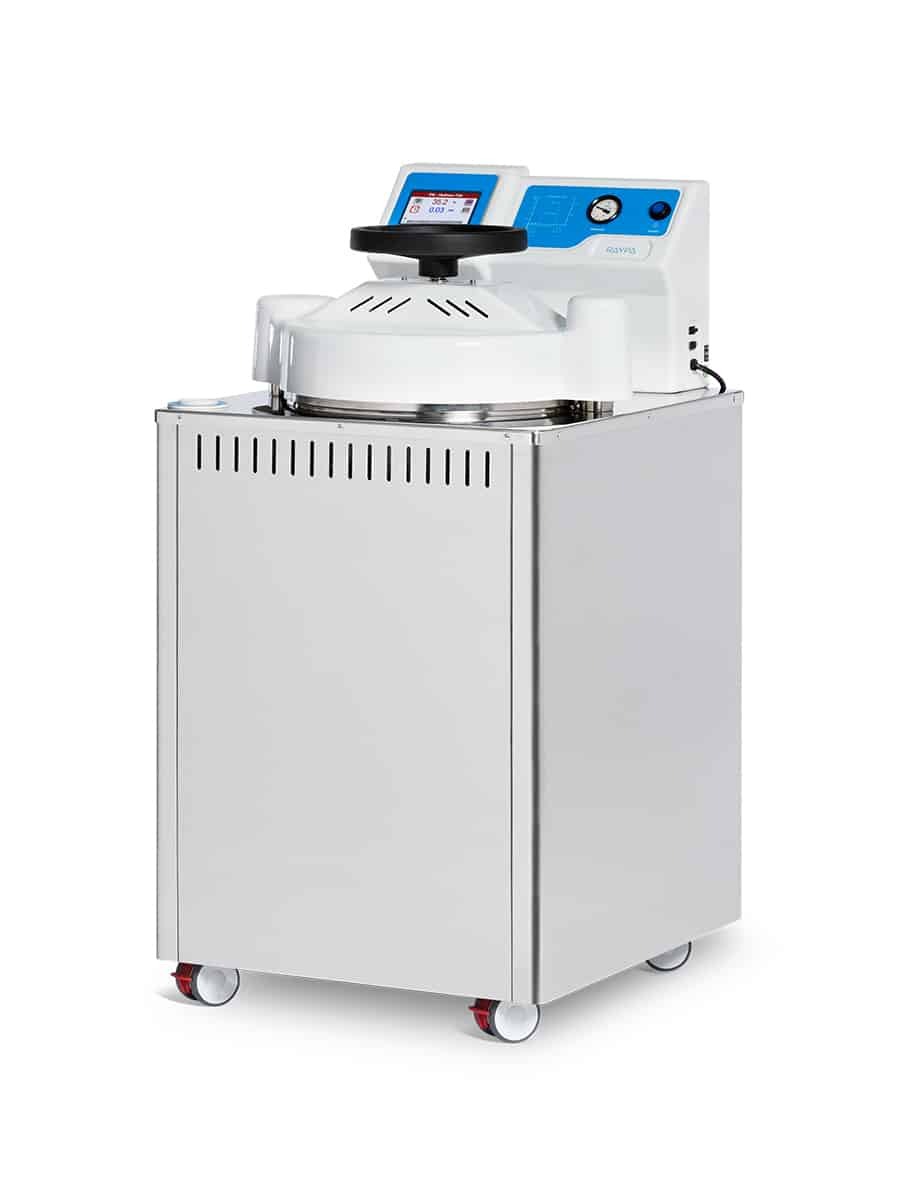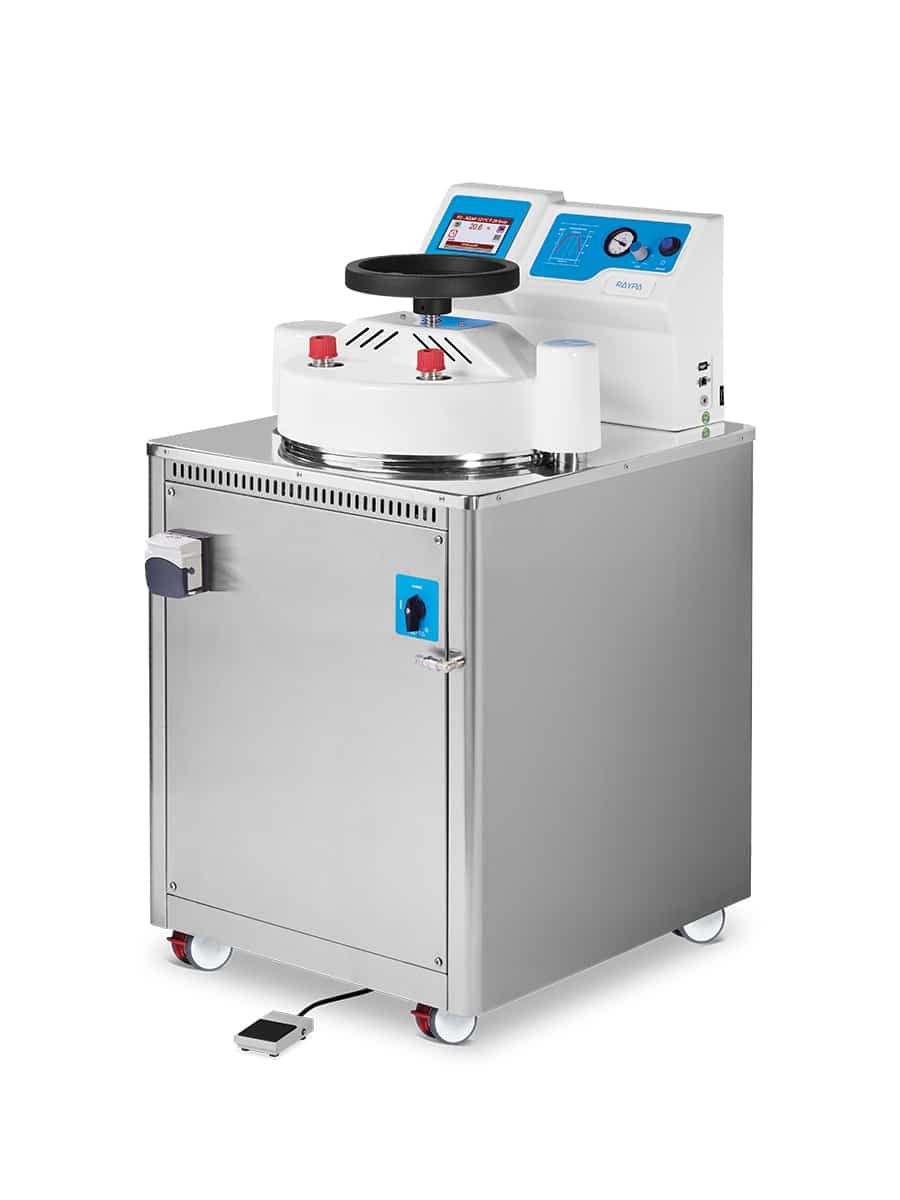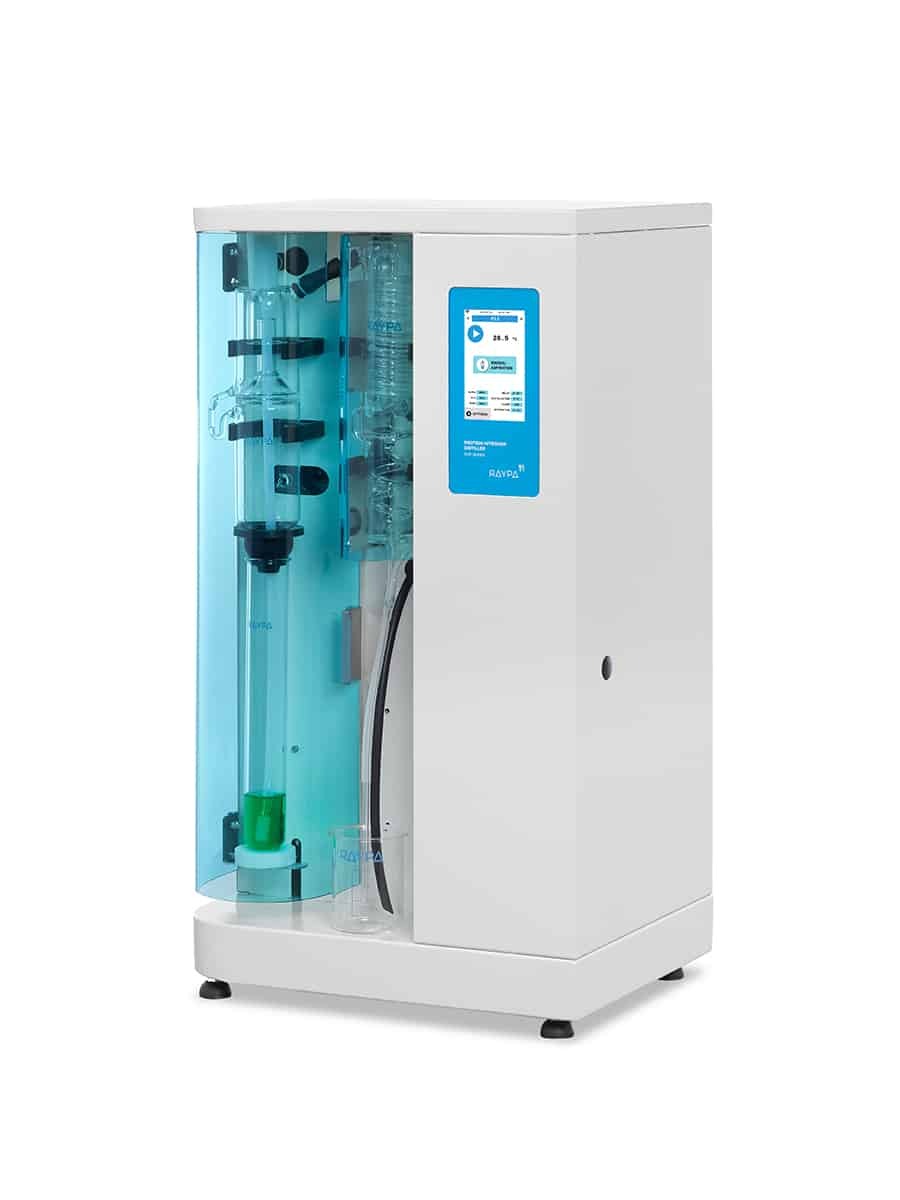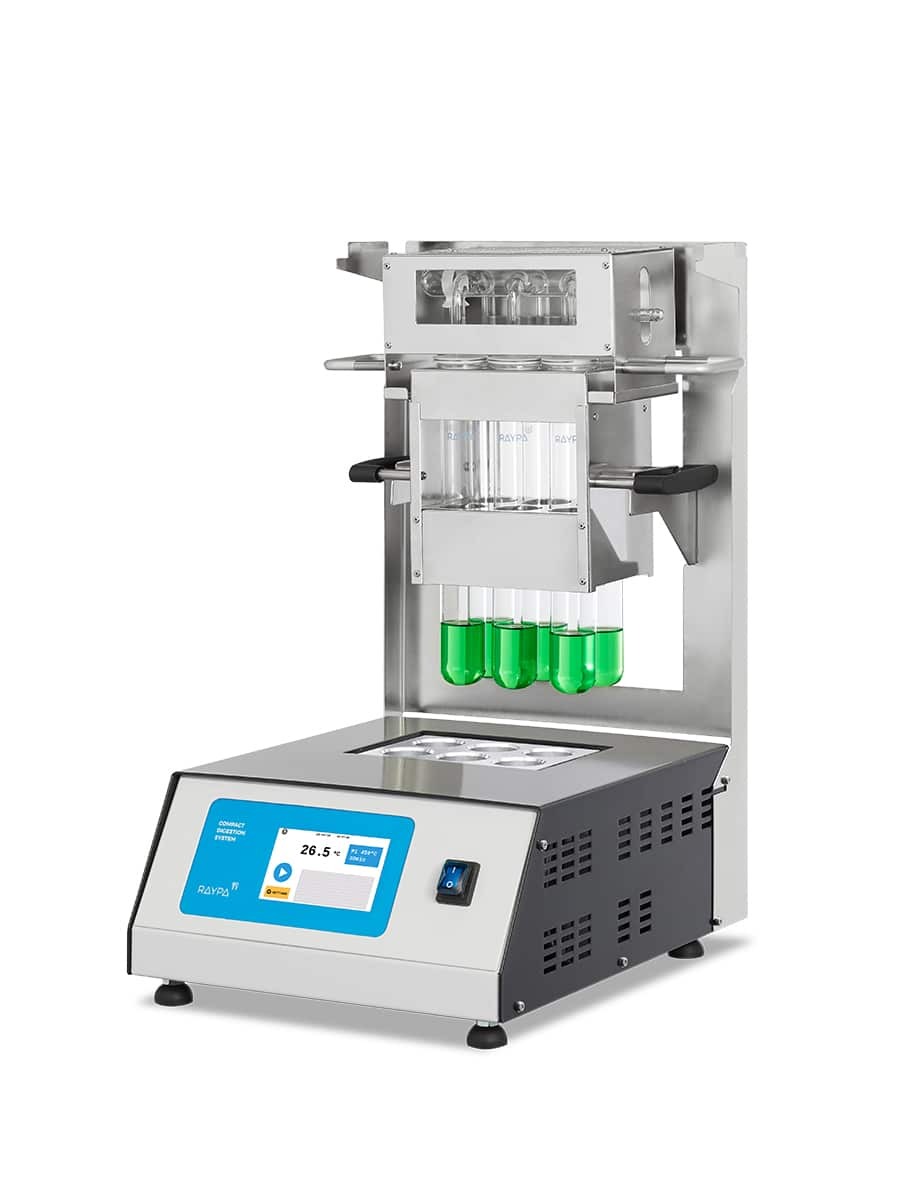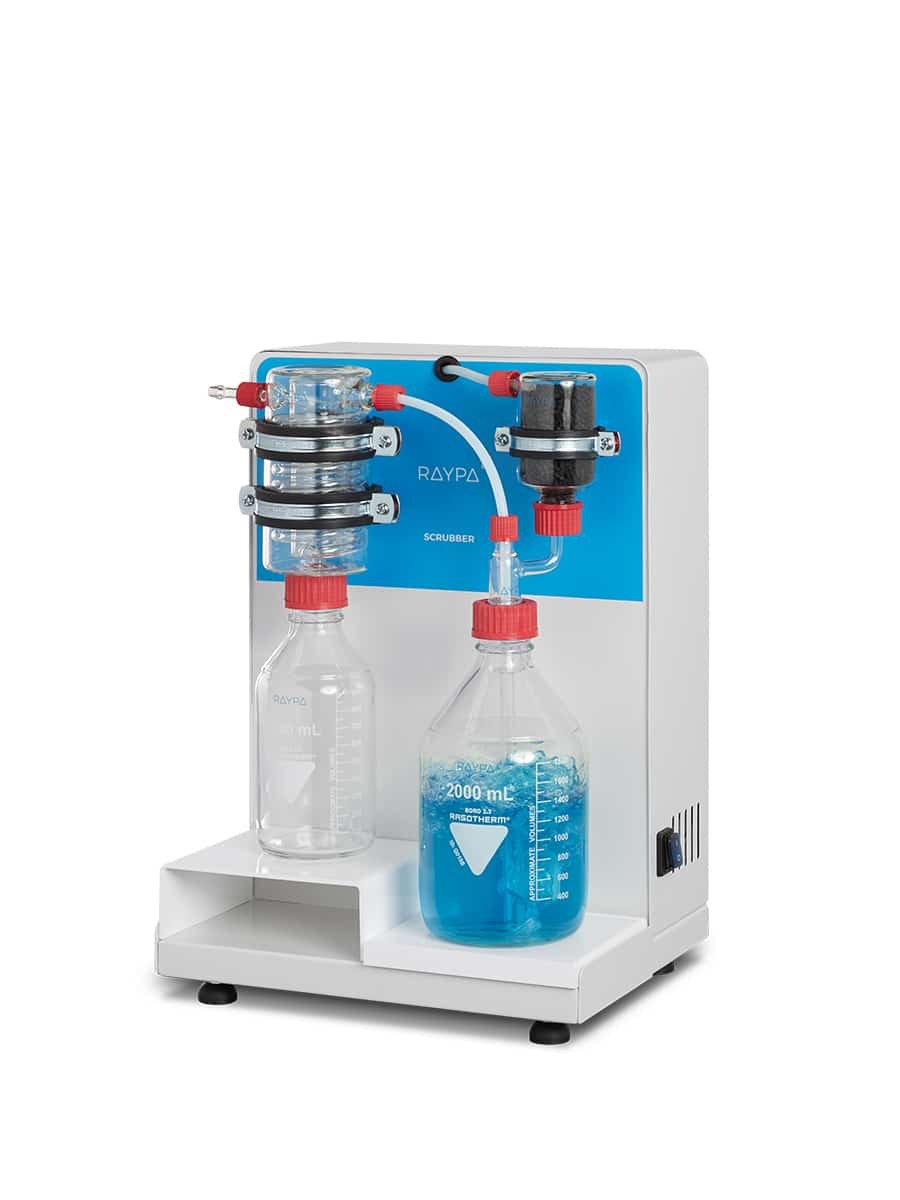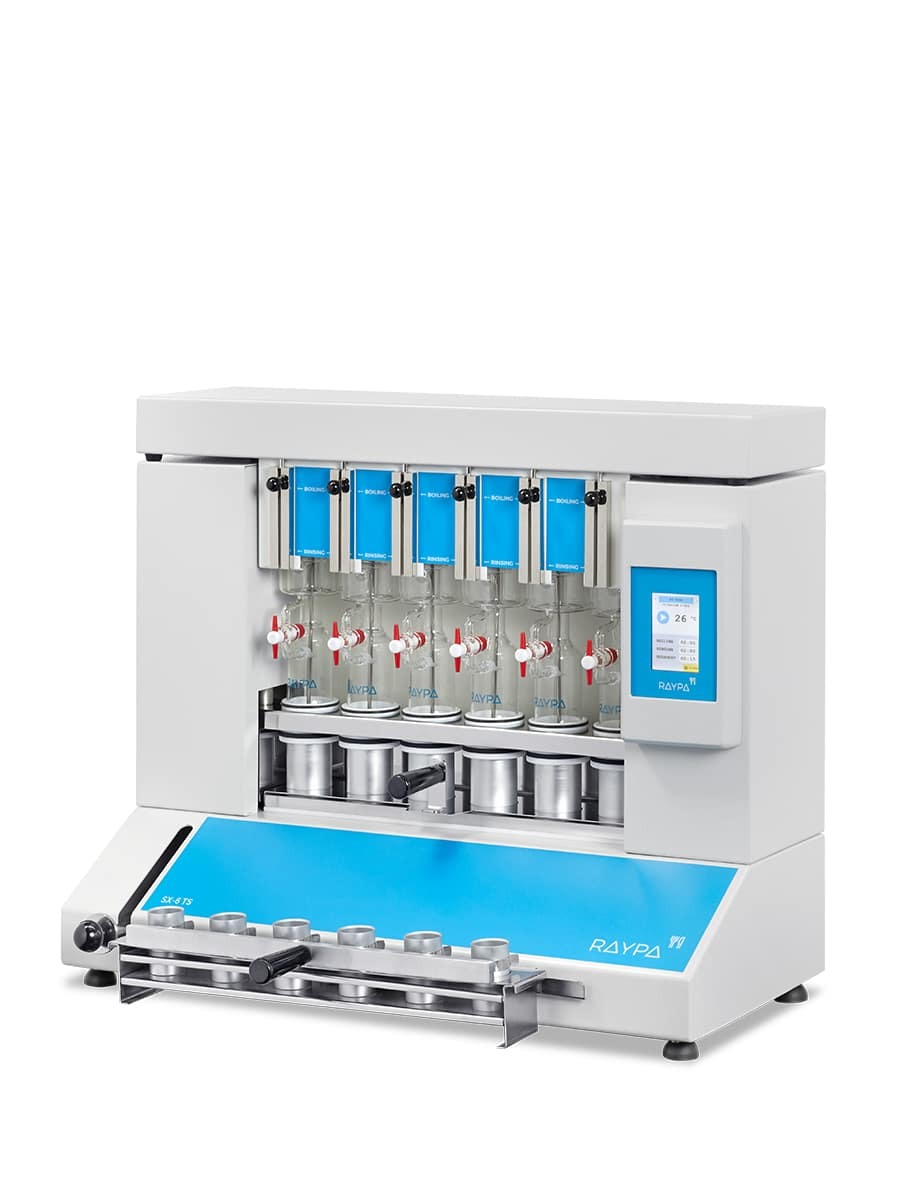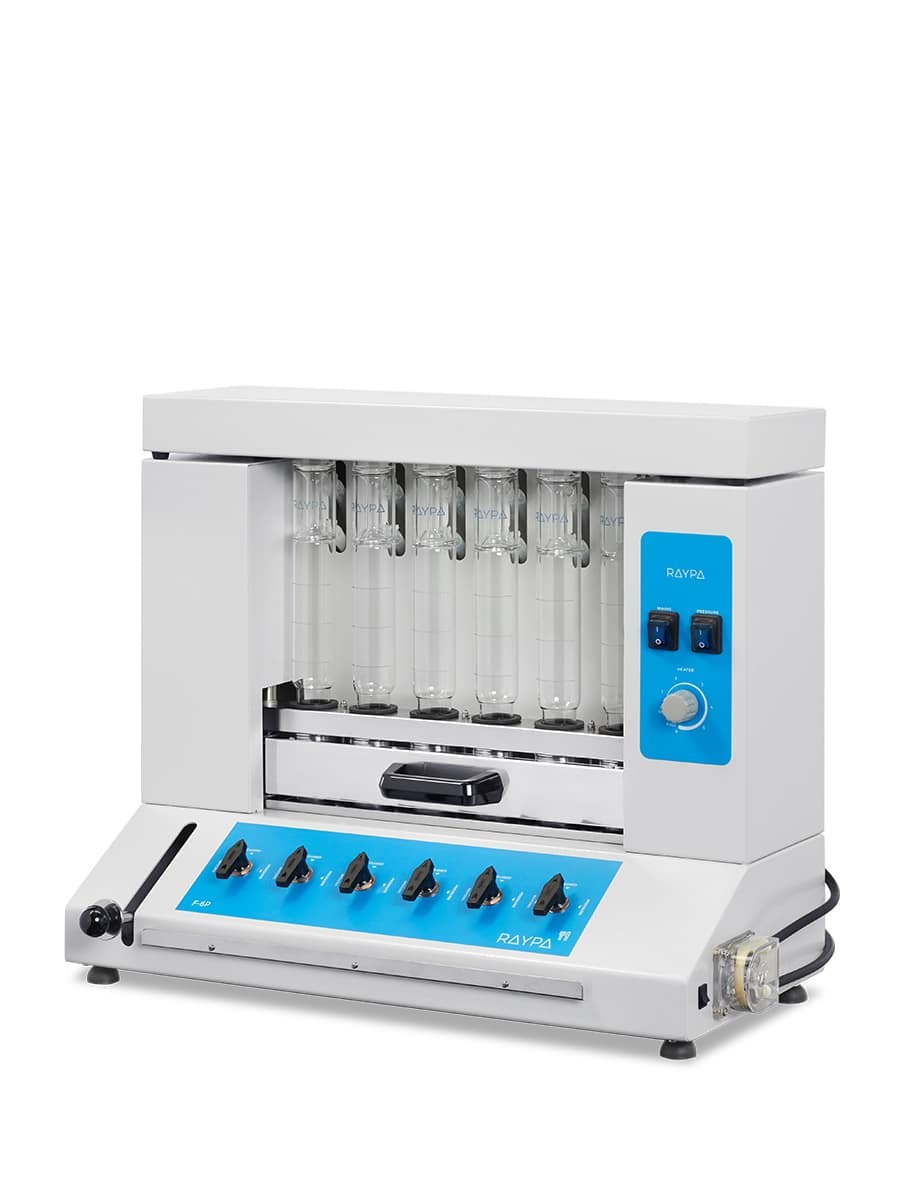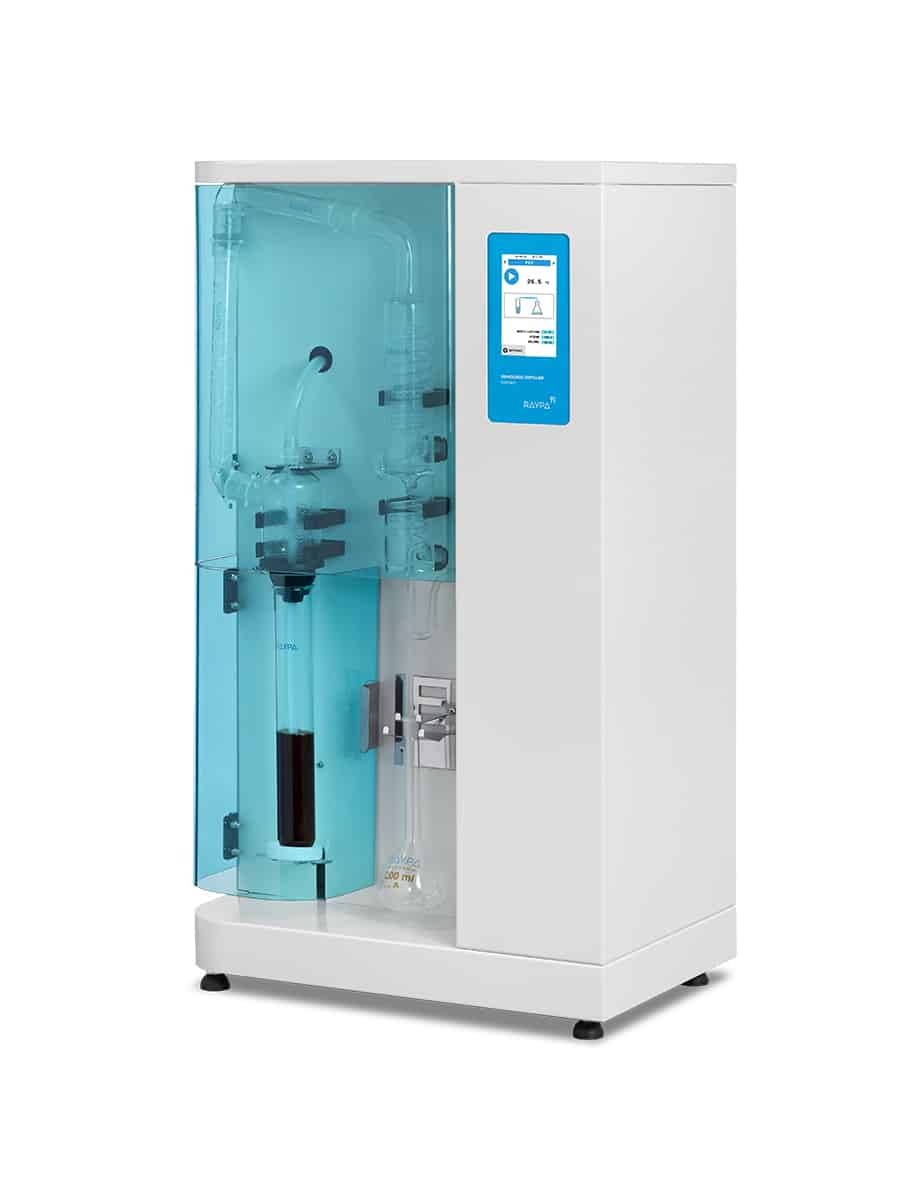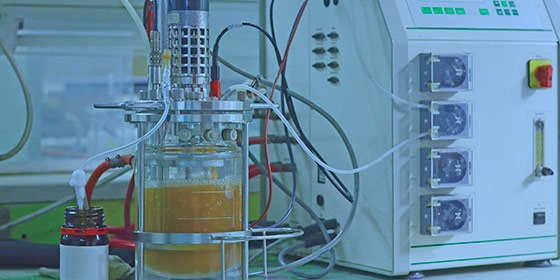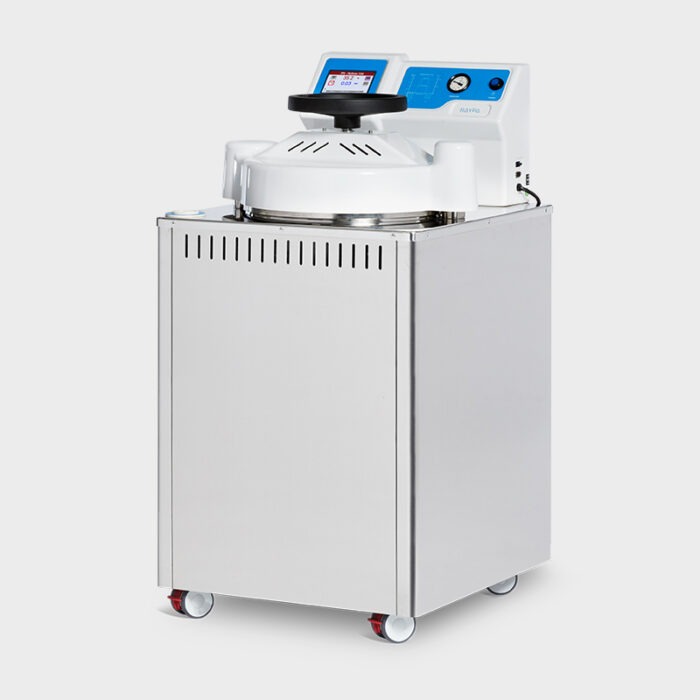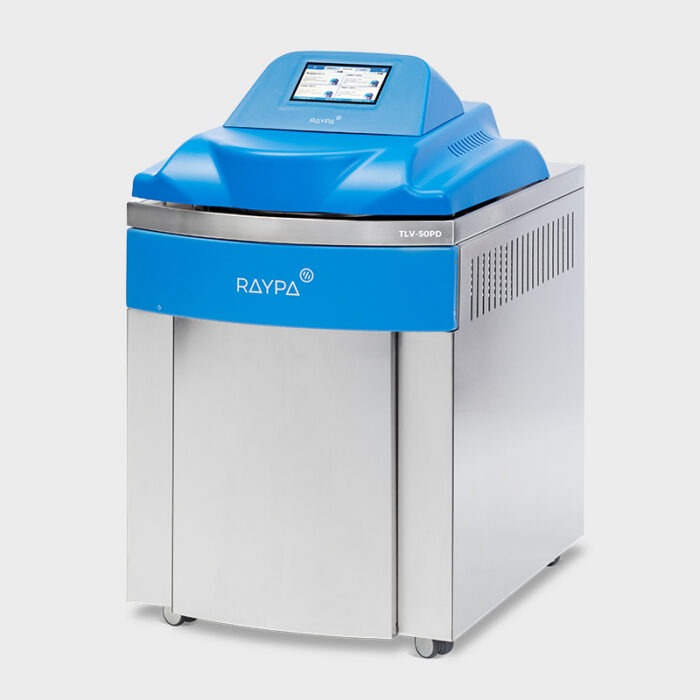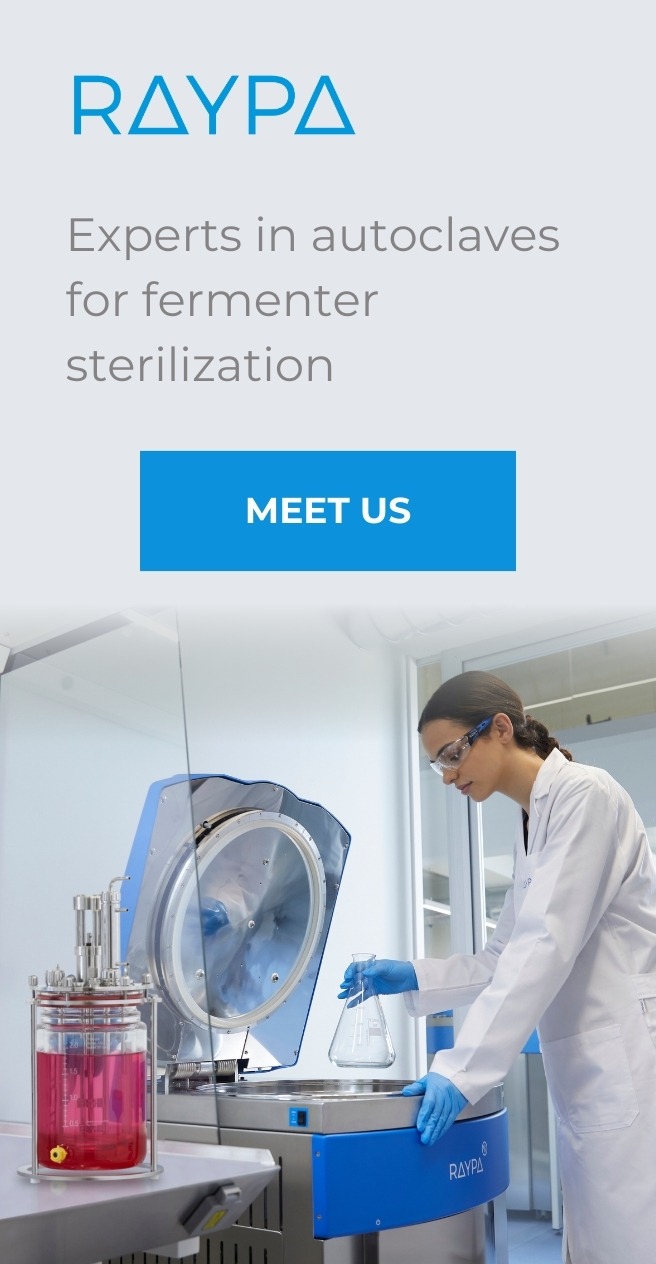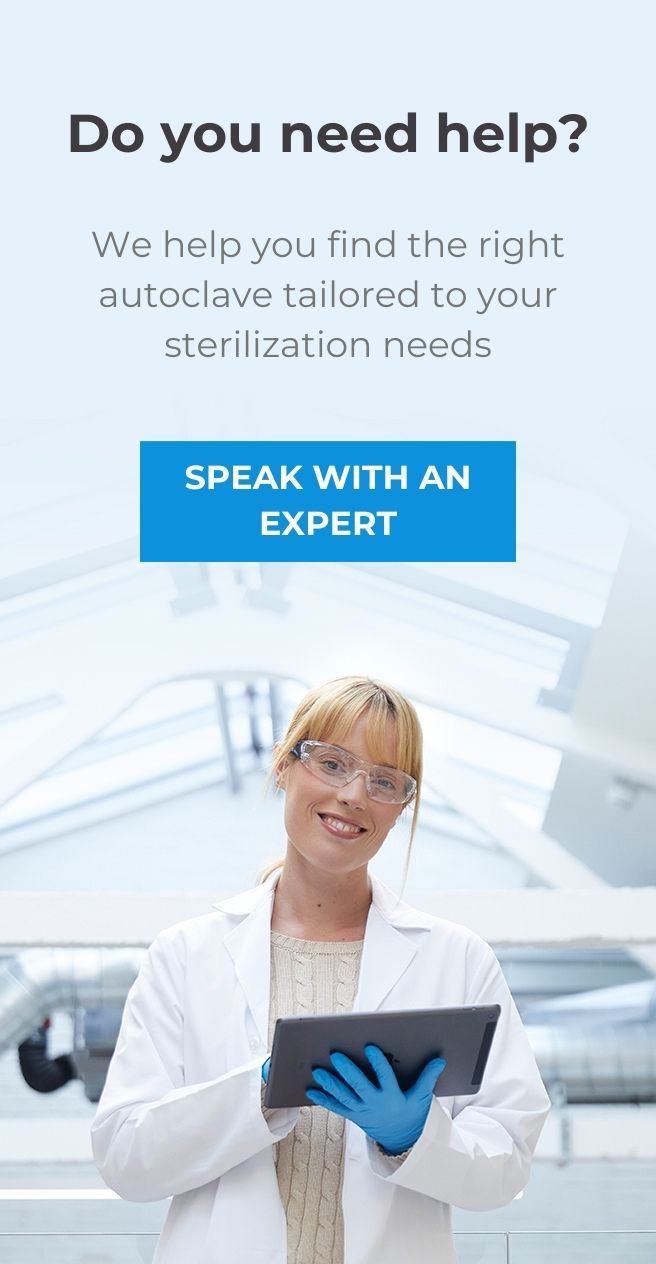The importance of the fermenter sterilization process
In the field of biotechnology, especially when working with bacteria, yeasts, or fungi, sectors such as food, pharmaceutical, and scientific research demand the cultivation and handling of microorganisms under strictly controlled conditions. In this scenario, fermenters play an essential role, being fundamental for a variety of purposes ranging from research and development to the production of bioproducts, food, food additives, chemicals, among others.
They are defined as biological vessels designed to foster the growth of microorganisms, whether bacteria, yeasts, or mammalian cells. These pieces of equipment provide a controlled environment for the proliferation of microbes and have systems to maintain ideal conditions, such as temperature and pH. They are vital in a range of processes from beer production to genetic research
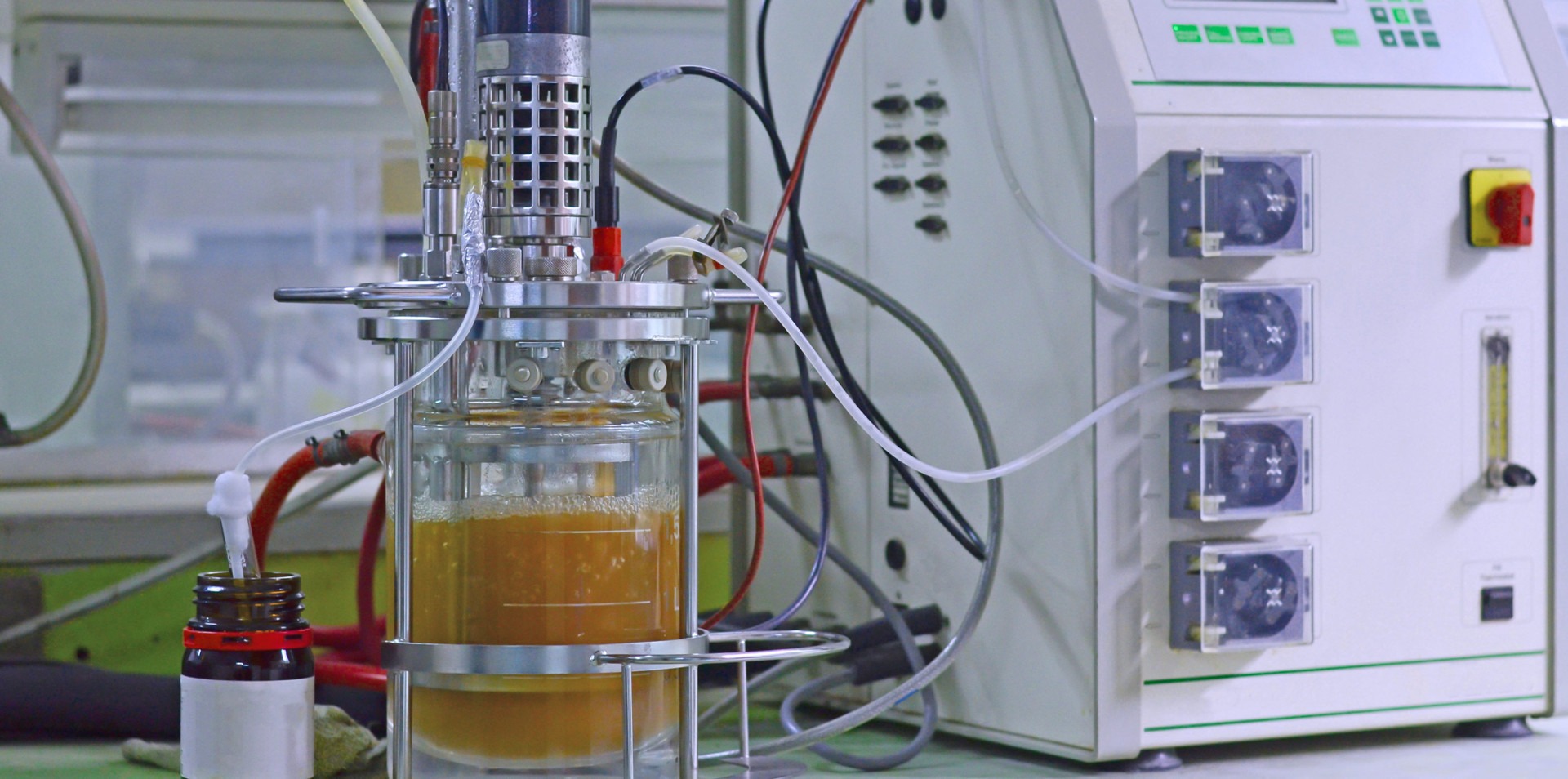
Sterilization of these devices is crucial to ensure the purity of the process and the integrity of the final product. Autoclaving stands out as one of the most effective and common methods for sterilizing fermenters, especially those smaller than 100 liters.
An autoclave is a device that uses high-pressure steam to destroy all types of microorganisms, including resistant spores, on objects or surfaces. It functions as a hermetic chamber that subjects materials to high temperatures and pressures for a specific period, effectively eliminating any form of microbial life and ensuring the sterility of the processed elements.
Before starting any fermentation activity, it is vital that both the fermenter and its components are fully sterilized. The presence of contaminants can interfere with the process, generating unwanted by-products, depleting resources, or, in extreme situations, contaminating final products intended for human consumption. Therefore, sterility is fundamental to maintain the accuracy, efficacy and safety of the process.
The need to use autoclaves for the sterilization of fermenters arises in various situations, such as when starting a new fermentation process, after performing maintenance or cleaning tasks on the fermenter, in the suspicion or detection of contamination, or when changing the type of microorganism or culture media used.
Steps to sterilize a fermenter in an autoclave
Sterilizationn of fermenters by autoclaving is a meticulous process that involves a series of key stages, which can vary slightly depending on the specific characteristics of the fermenter and the autoclave.
Initially, it is imperative to perform a thorough cleaning of the fermenter to remove any residue. It is essential to ensure that all components that need to be sterilized, such as probes, pipes, and impellers, are exposed to steam appropriately. It is also important that all valves and tubes are open so that steam can freely circulate inside all cavities and surfaces of the fermenter.
In the case of small-scale or benchtop fermenters, it is possible to sterilize them entirely within an autoclave. However, large-scale industrial fermenters, with capacities exceeding 100 liters, require a sterilization methodology adapted to their dimensions.
The sterilization cycle begins once the autoclave is closed and the sterilization program is started. The first step involves evacuating the air, which is essential to ensure even distribution of steam throughout the interior space. Subsequently, saturated steam is injected to raise both the temperature and pressure inside the chamber. As a general rule, a minimum temperature of 121°C and a pressure of 2 bar should be maintained for 15 to 30 minutes. However, these values can be modified to suit the particular requirements of each process and type of equipment used.
After completing the sterilization cycle, the autoclave begins to slowly release the steam and reduce the pressure. Once the temperature and pressure return to safe levels, the fermenter is removed. At the end of the sterilization cycle, the autoclave initiates the controlled release of steam and the gradual decrease in pressure. Once the temperature and pressure reach safe levels, the fermenter is then removed.
It is crucial to confirm the effectiveness of the sterilization. This quality control is carried out through biological tests, which involve the use of biological indicators, commonly bacterial spores with high thermal resistance, placed in the fermenter during the process. The successful destruction of these spores indicates that the sterilization has been effective.
General recommendations for sterilizing a fermenter using an autoclave
- Pre-sterilization cleaning: It is essential to disassemble and thoroughly clean each component of the fermenter using specific detergents and purified water. This includes cleaning the fermenter vessel, as well as all accessories and supports used during the process.
- Disassembly of specific components: According to the manufacturer’s instructions, it is necessary to remove certain components, such as heat-sensitive parts or elements that may obstruct the circulation of steam, before proceeding with autoclaving.
- Applicability only for reusable fermenters: Autoclave sterilization should only be applied to fermenters designed to be reused. Single-use fermenters, by the nature of their design and construction materials, should not be reused.
- Comprehensive sterilization: It is crucial that sterilization covers not only the interior of the fermenter but also all its components, including filters, valves and any other component that may come into contact with the culture media. It is important to ensure that valves are open or in a position that allows free passage of steam to ensure complete sterilization.
- Proper selection of the autoclave: While autoclaves with a pre-vacuum function are generally preferred for this purpose, it is essential to consider the fermenter manufacturer’s recommendations on the most suitable type of autoclave, taking into account the specifications and construction materials of the fermenter.
- Handling of large fermenters: When using medium-sized fermenters, which can exceed 10 kg in weight once filled, the use of cranes is advised to make their handling safer and simpler, both for introducing them into and removing them from the autoclave.
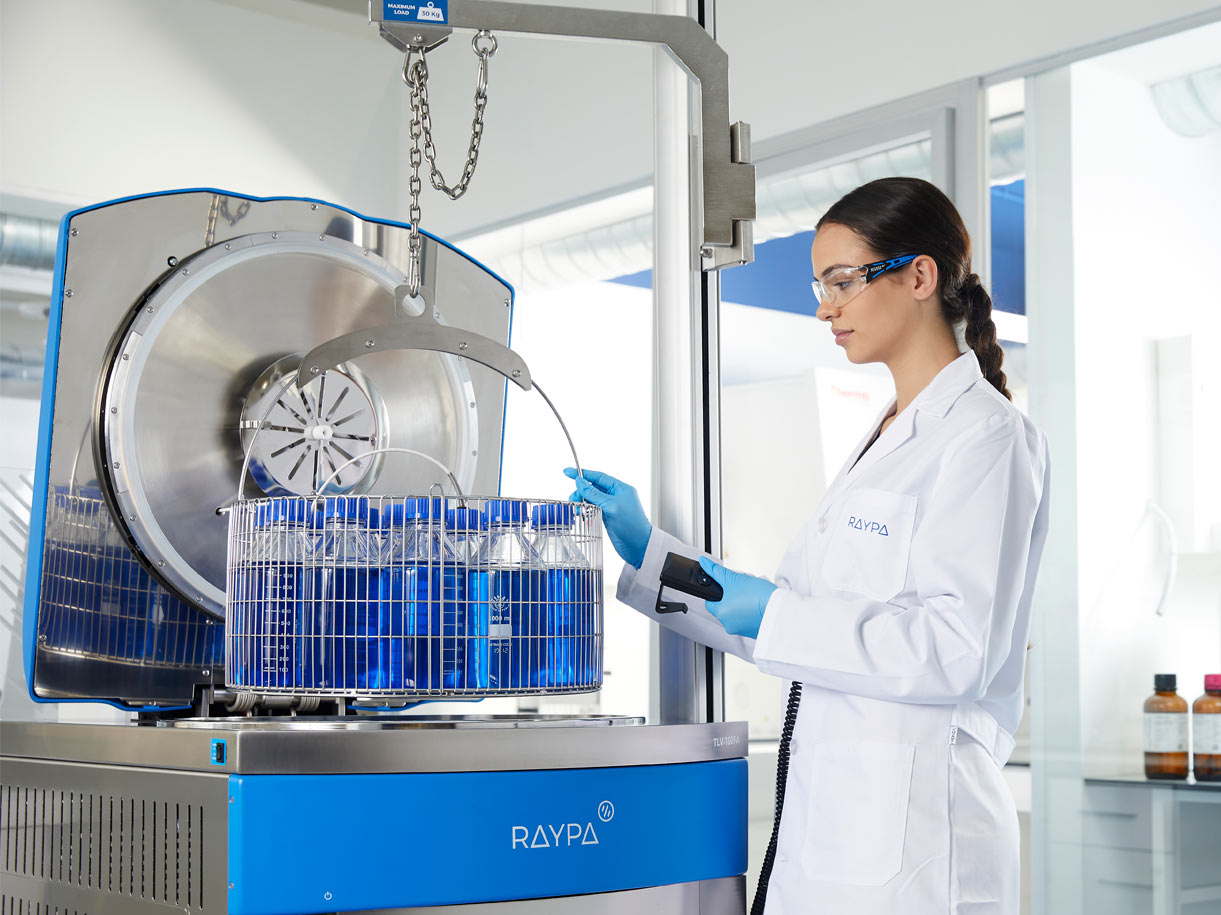
Recommendations for validating a fermenter sterilization protocol with an autoclave
- Process compatibility and validation: It is essential to ensure the fermenter’s compatibility with the selected sterilization parameters, such as temperature and time, following the maximum tolerances specified by the manufacturer. Additionally, maintaining a constant volume of culture media is important, as different volumes may require adjustments in sterilization times. Each combination of conditions must be validated through empirical testing and carefully documented in a specific protocol. The use of biological and physical indicators at various points inside the fermenter is crucial to verify the effectiveness and adequacy of the sterilization process.
- Continuous temperature monitoring: To confirm the effectiveness of sterilization in a fermenter loaded with culture media, it is advisable to insert a datalogger within the media. This instrument should measure and record temperatures during the initial validation phases, ensuring that a minimum lethality of F0=20 is achieved, indicating a successful sterilization process.
- Adjustment of exposure times: The duration required for sterilizing a fermenter, whether empty or filled with media, can vary considerably. Specifically, liquids often require longer exposure times. Studies have shown that sterilizing 10 liters of media in a 15-liter fermenter at 127°C for 75 minutes might not achieve a lethality of F0=20. In these situations, it is advisable to sterilize the culture media and the fermenter separately.
- Avoiding overcooking of the culture media: An excessively long sterilization cycle can cause caramelization of sugars and accumulation of salts, negatively affecting the quality of the media. It is crucial to understand the thermal sensitivity of the media and how the sterilization process impacts this. To optimize exposure time during sterilization, it may be beneficial to use an autoclave with fast cooling capability, thus minimizing cooling time and exposure of the media to excessive heat during the cooling phase.
- Equipment qualification and maintenance:The qualification of Installation (IQ), Operation (OQ), and Process (PQ) for both the autoclave and the sterilization process are fundamental to ensure that we are doing things correctly. Additionally, to maintain the effectiveness of our method over time, it is crucial to adhere strictly to the maintenance program recommended by the autoclave manufacturer. This helps prevent loss of efficacy or calibration issues, thus ensuring optimal equipment performance.
Recommended autoclaves for fermenter sterilization
One of the most commonly used types of autoclave for sterilizing fermenters is the vertical autoclave with pre-vacuum and drying, especially for larger formats. In these, the entry of the fermenter into the chamber is done from the top, and given the dimensions of some bioreactors that can weigh up to 40kg, it is common to need a crane for handling.
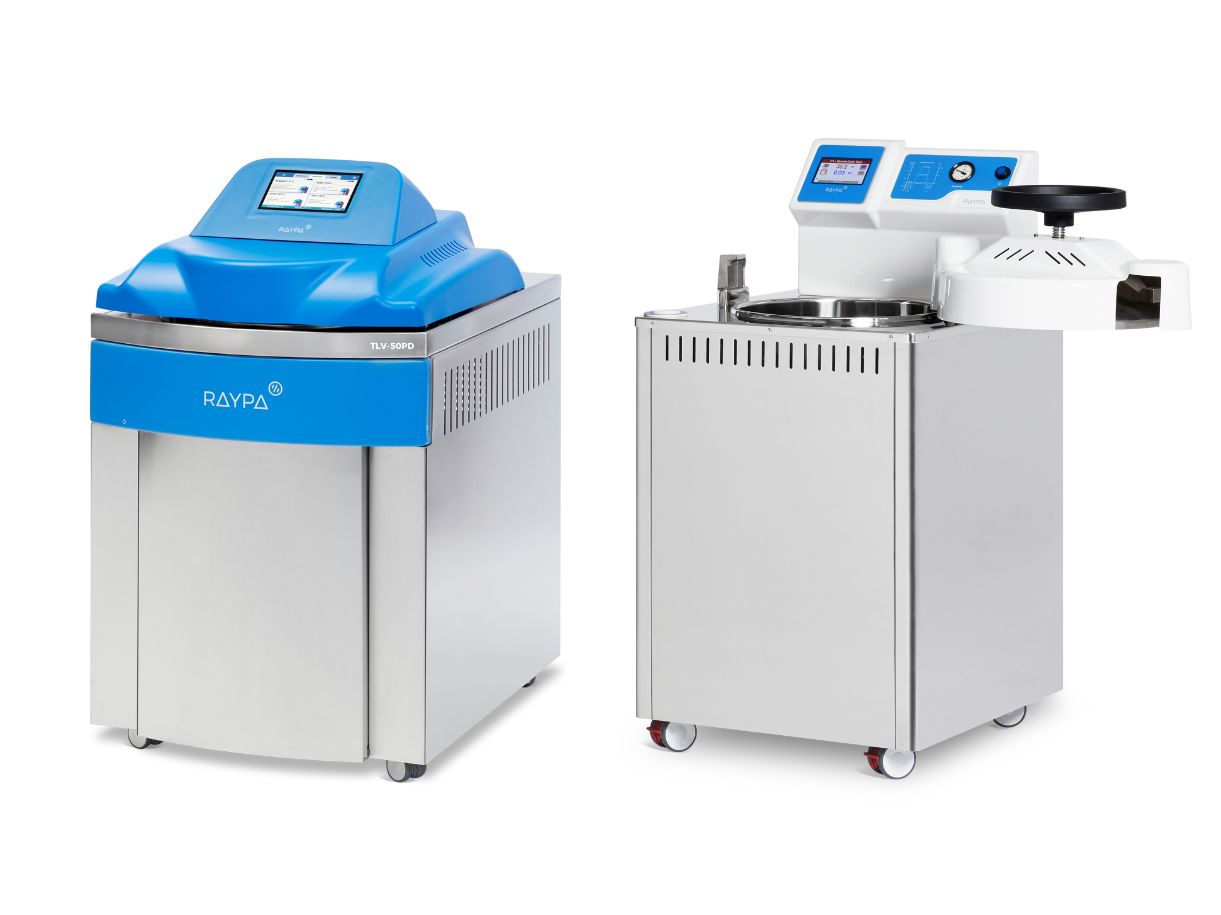
Our autoclaves allow the sterilization of fermenters from the leading brands on the market. While we have clients working with multiple brands whom we have advised and helped to validate their processes, we always recommend contacting the fermenter manufacturer to receive technical advice on the fermenter specifications, how it should be placed in the autoclave, and the temperature and pressure tolerances allowed.
The fermenter sector is very broad, but if you are looking for a manufacturer, we recommend considering the following leading brands: Sartorius fermenters Eppendorf’s BioFlo®, INFORS HT’s Labfors, Getinge’s Applikon Bio, Distek’s BIOne, Solaris Biotech’s Jupiter, and Labfirst Scientific fermenters.
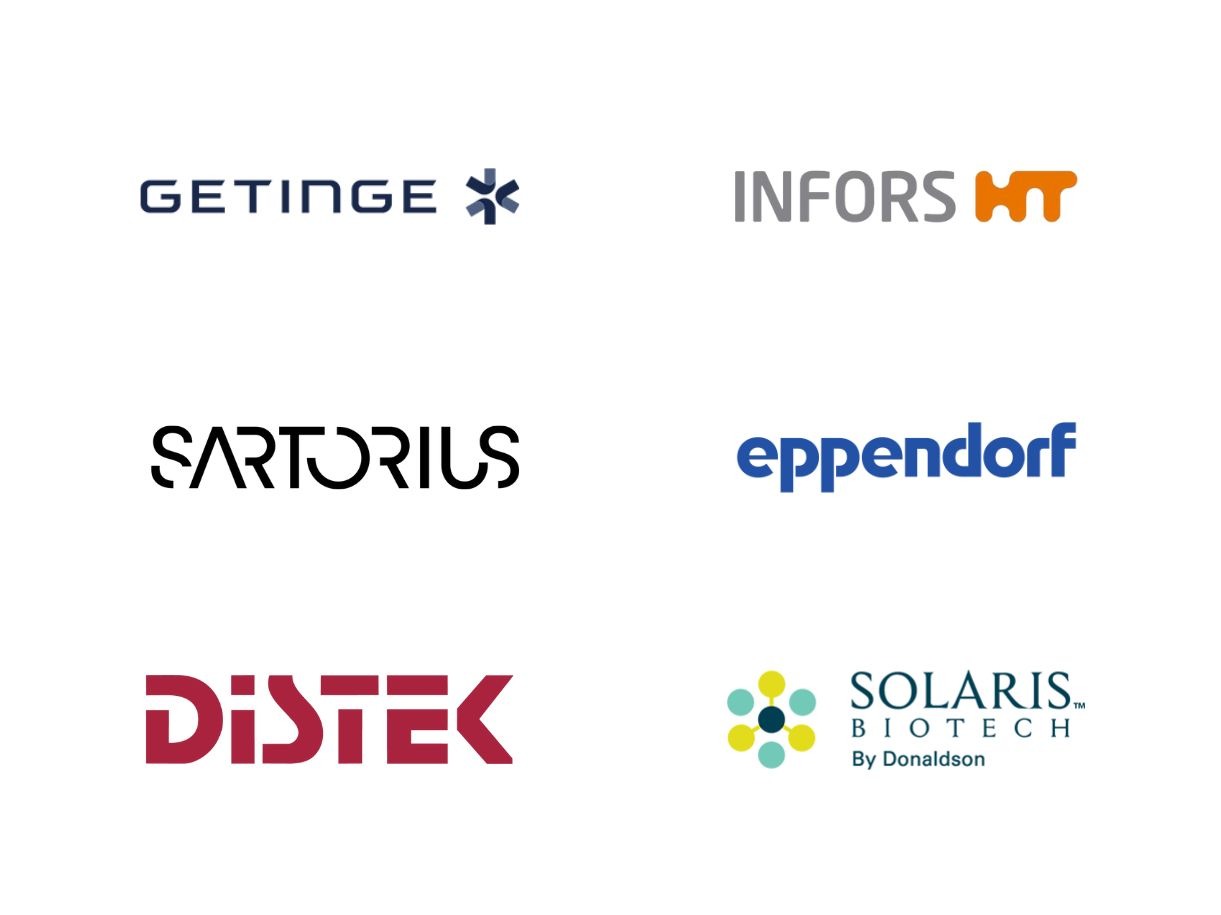
Steam sterilization of Getinge’s Applikon Bio Fermenters using an autoclave
Getinge is a Swedish medical technology company with over a century of experience, specializing in solutions for the healthcare and life sciences sectors, including infection control and intensive care. Among its most notable products are disinfectors, sterilization equipment, surgical tables, ventilators, extracorporeal circulation machines, anesthesia, digital hospital integration solutions, bioreactors and fermenters.
Getinge’s Applikon Bio fermenters stand out for their adaptability and efficiency. These glass fermenters are designed for laboratory-scale cellular and microbial cultivation and are fully compatible with autoclave sterilization. This ensures a completely sterile environment, essential for safely conducting biotechnological research. The fusion of Getinge’s vast experience in healthcare and life sciences, and the advanced technology incorporated in the Applikon Bio fermenters, makes them a standout choice for a wide variety of applications and laboratories.
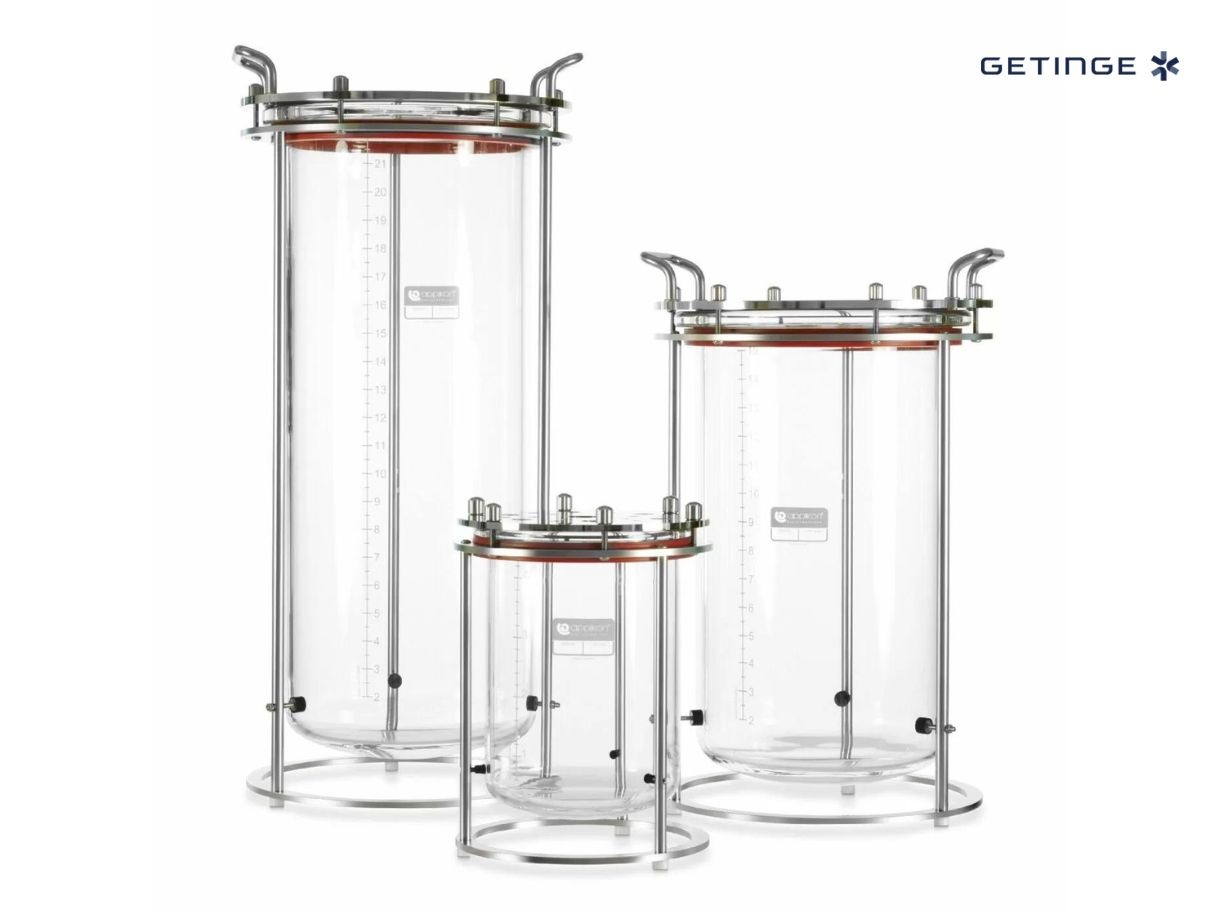
Do you have a RAYPA autoclave and want to know how to sterilize your Getinge Applikon Bio fermenter? Contact us and our experts will advise you on the best way to do it. We will be delighted to answer your questions about our equipment and offer our recommendations.
Sterilization of Sartorius fermenters using an autoclave
Sartorius, with a history of more than 150 years, has established itself as a benchmark in the life sciences sector, especially in the biopharmaceutical field. The German company specializes in supporting its clients in the development and production of biotechnological medicines and vaccines, from the initial idea in the laboratory to commercial production. As one of the leaders in this field, Sartorius provides an extensive range of solutions and products related to these areas.
In the context of fermenter sterilization, models such as Sartorius‘s Univessel® Glass, Ambr®, and Biostat® stand out for their autoclavable design and versatility, suitable for both research and biotechnological production. These systems are valued for their innovation, market durability, and the variety of volumes available, facilitating cleaning and adaptation to various biotechnological needs. The effectiveness of the Univessel® Glass fermenters, along with the advanced capabilities of the Ambr® and Biostat® models, is crucial for driving both the biopharmaceutical industry and scientific research, making them essential tools for development in these fields.
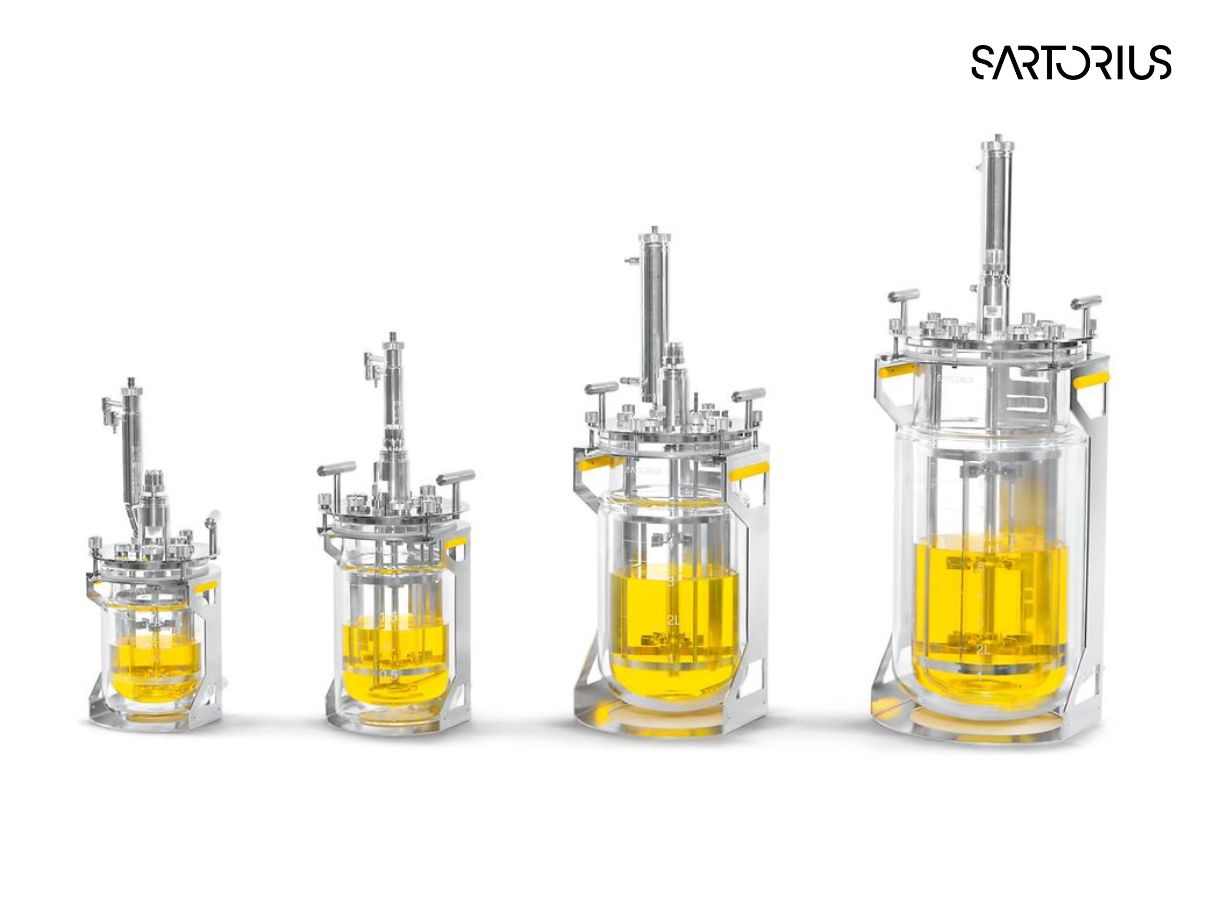
Do you have a RAYPA autoclave and want to know how to sterilize your Sartorius fermenter? Contact our experts and they will advise you on the best way to do it. We will be happy to answer your questions about our equipment and give you our recommendations.
Sterilization of Eppendorf’s BioFlo® bioreactors using autoclaves
Eppendorf is a global leader in the development, manufacturing, and distribution of laboratory equipment and consumables for scientific and clinical research. Founded in 1945 in Hamburg, Germany, Eppendorf offers a wide range of innovative products, such as centrifuges, pipettes, thermal cyclers and incubators, designed to meet the needs of laboratories worldwide.
Among its varied product catalog, Eppendorf presents the BioFlo® fermenter, designed to meet the demands of research and development in the field of biotechnology. These fermenters are available with rounded stainless steel bottoms for efficient heat transfer, as well as in water-jacketed models for smoother temperature control. They are offered in four different sizes, with multiple agitation options and interchangeable accessories for top magnetic stirring or direct drive.
Sterilization of BioFlo® fermenters by autoclaving plays a key role in maintaining a sterile and reliable culture environment. This practice is essential to ensure the integrity and viability of the cultures, thus contributing to the success of the biotechnological cultivation processes.
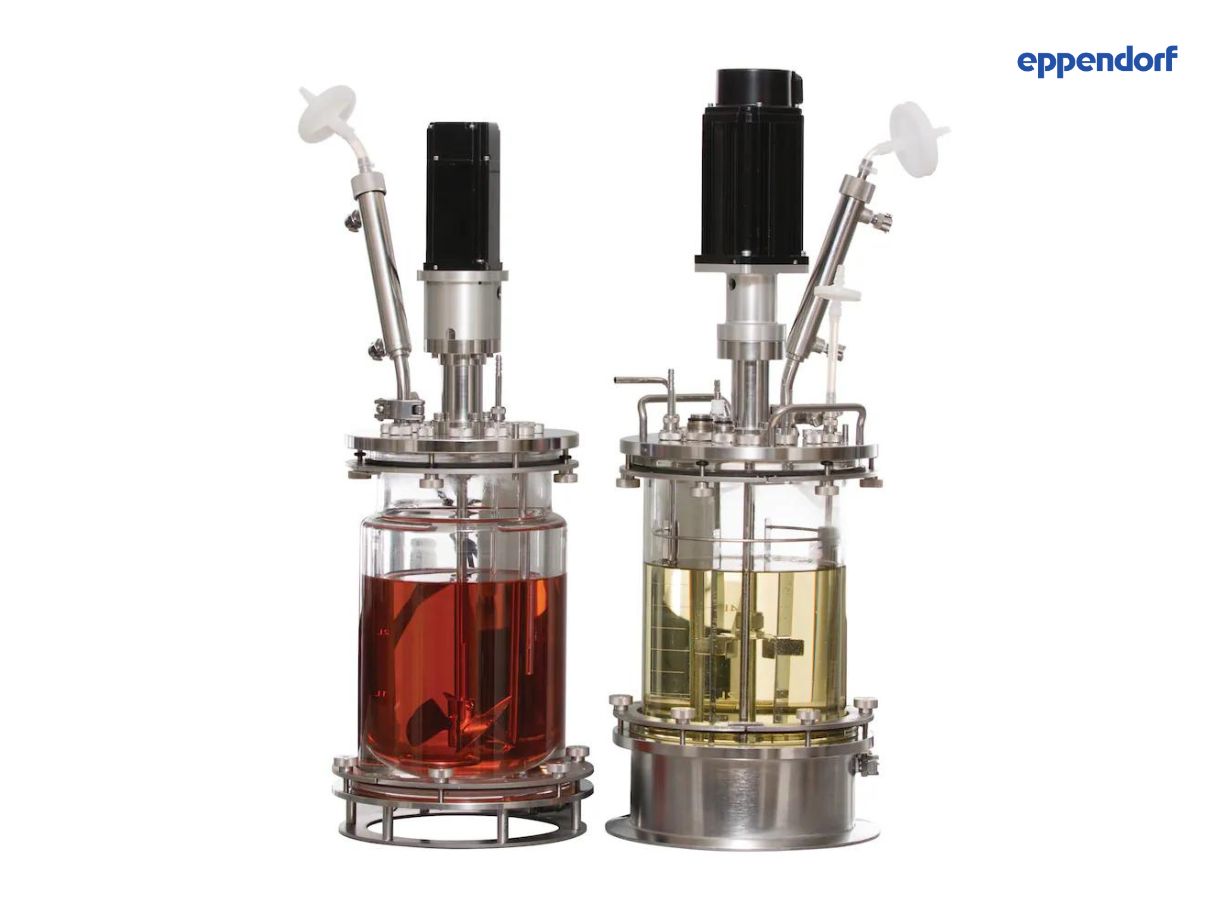
Do you have a RAYPA autoclave and want to know how to sterilize your Eppendorf BioFlo® fermenter? Contact us and our experts will advise you on the best way to do it. We will be delighted to answer your questions about our equipment and offer our recommendations.
Steam sterilization of Infors HT’s Labfors 5 fermenters using an autoclave
Infors HT, with over 55 years of history, has established itself as a benchmark in the development and manufacturing of advanced technological solutions for the biotechnology sector. The Swiss company specializes in bioreactors, fermenters, shaker incubators and bioprocess control software, significantly contributing to the advancement of research and production in biotechnology, biopharmaceuticals, food technology, cosmetics, agricultural technology and research institutes globally.
Within the field of fermenter sterilization, Infors HT Labfors models stand out as a versatile and effective solution for a wide range of biotechnological applications. These benchtop fermenters are designed for microbial, cellular, enzymatic, and phototrophic cultures, offering flexibility in terms of gasification configuration and volume. They are characterized by their compatibility with a diverse range of accessories and peripherals, which allows them to meet the specific needs of each biotechnological application. Thus, the Labfors establish themselves as an essential tool for researchers and scientists dedicated to biotechnology.
Effective sterilization of Labfors fermenters using an autoclave is crucial to ensure the integrity and sterility of cultures, thereby guaranteeing the reliability and accuracy of experimental results.
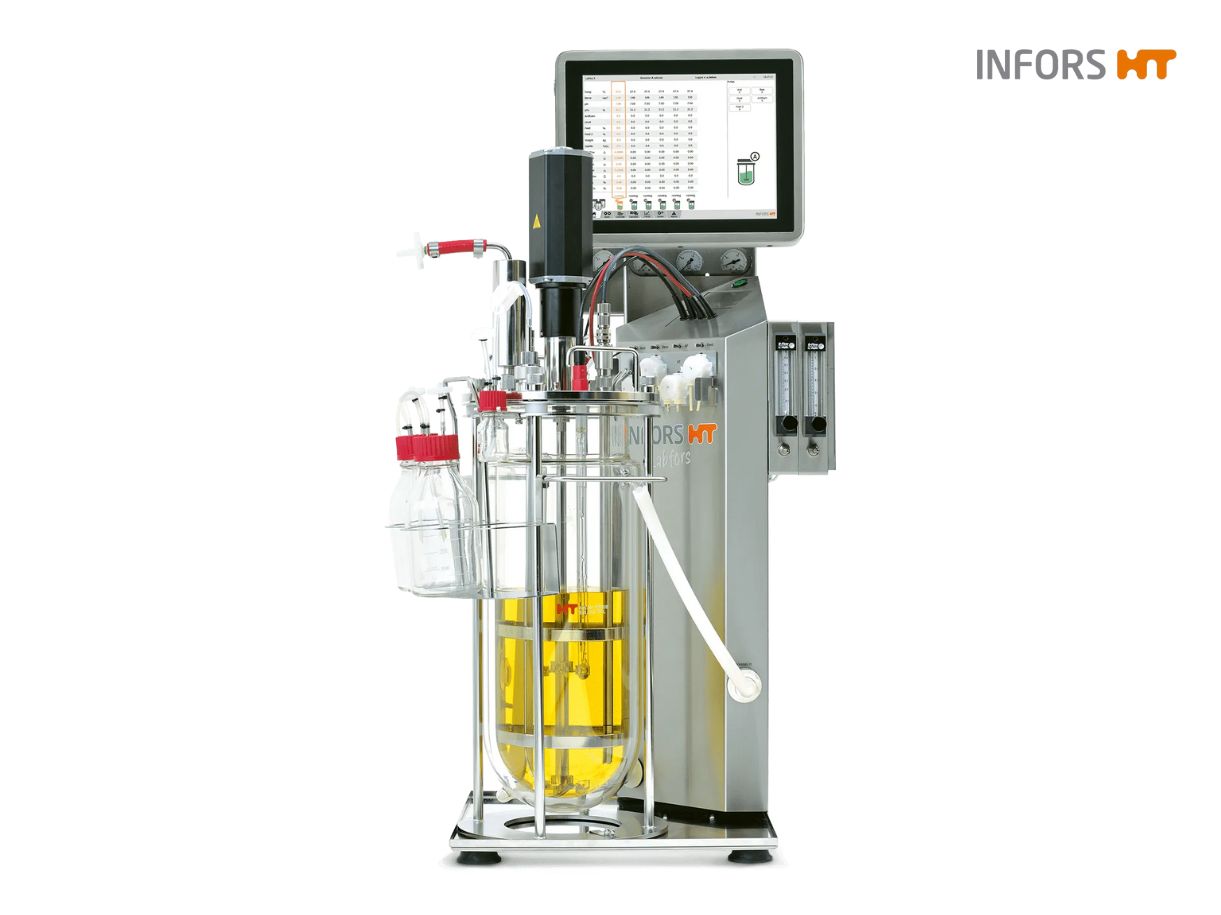
Do you have a RAYPA autoclave and want to know how to sterilize your Infors HT Labfors fermenter? Contact us and our experts will advise you on the best way to do it. We will be delighted to answer your questions about our equipment and offer our recommendations.
Steam sterilization of Distek’s BIOne fermenters using an autoclave
Distek, Inc. with over 47 years of experience, has established itself as a leading manufacturer of laboratory testing instruments for the pharmaceutical and biotechnology industries. In addition to its production, it offers validation and qualification services.
Distek’s BIOne fermenter, available in volumes from 2L to 10L, is designed to support the unique needs of demanding microbial bioprocesses, ensuring proper mass and thermal transfer. This product underlines Distek’s commitment to quality, innovation, and comprehensive support, contributing to the advancement of science and productive efficiency in the sector.
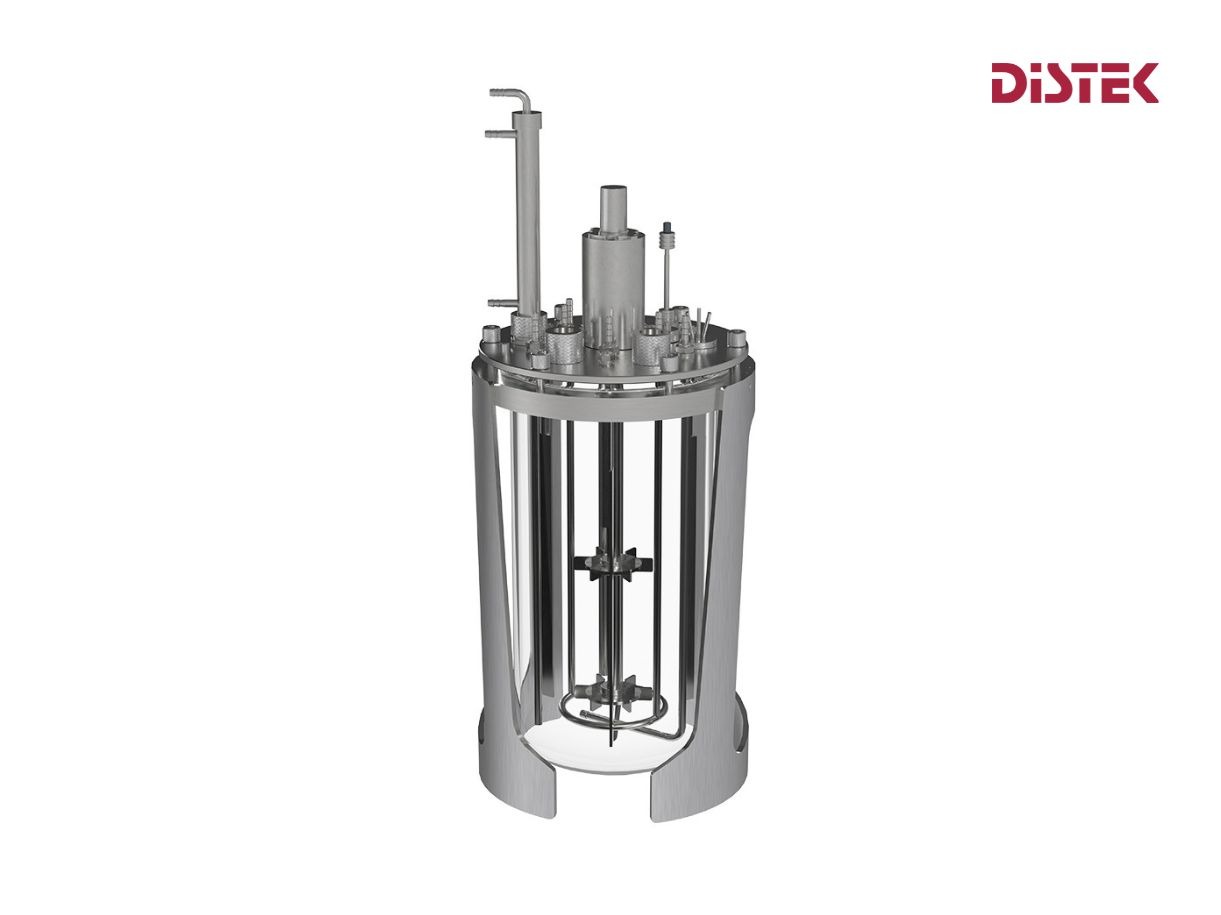
Do you have a RAYPA autoclave and want to know how to sterilize your Distek BIOne fermenter? Contact us and our experts will advise you on the best way to do it. We will be delighted to answer your questions about our equipment and offer our recommendations.
Steam sterilization of Solaris Biotech’s Jupiter fermenters with autoclave
Solaris Biotech is an Italian company specialized in fermenters, bioreactors and filtration systems for research and development (R&D) and production purposes. Since its foundation, it has evolved to serve a wide range of sectors, standing out for its commitment to innovation and quality in biotechnology, thus contributing to the advancement of science and productive efficiency.
The Jupiter fermenters, developed by Solaris Biotech, are presented as equipment intended for the field of biotechnology, covering needs in research, process development, and small-scale production. These autoclavable devices have been designed to withstand autoclave sterilization processes, which facilitates maintaining the sterile conditions necessary for conducting both aerobic and anaerobic cultures. The autoclavability of these systems is highlighted as a relevant feature to ensure closed aseptic operations, contributing to the integrity and viability of cultures in research and biotechnological applications.
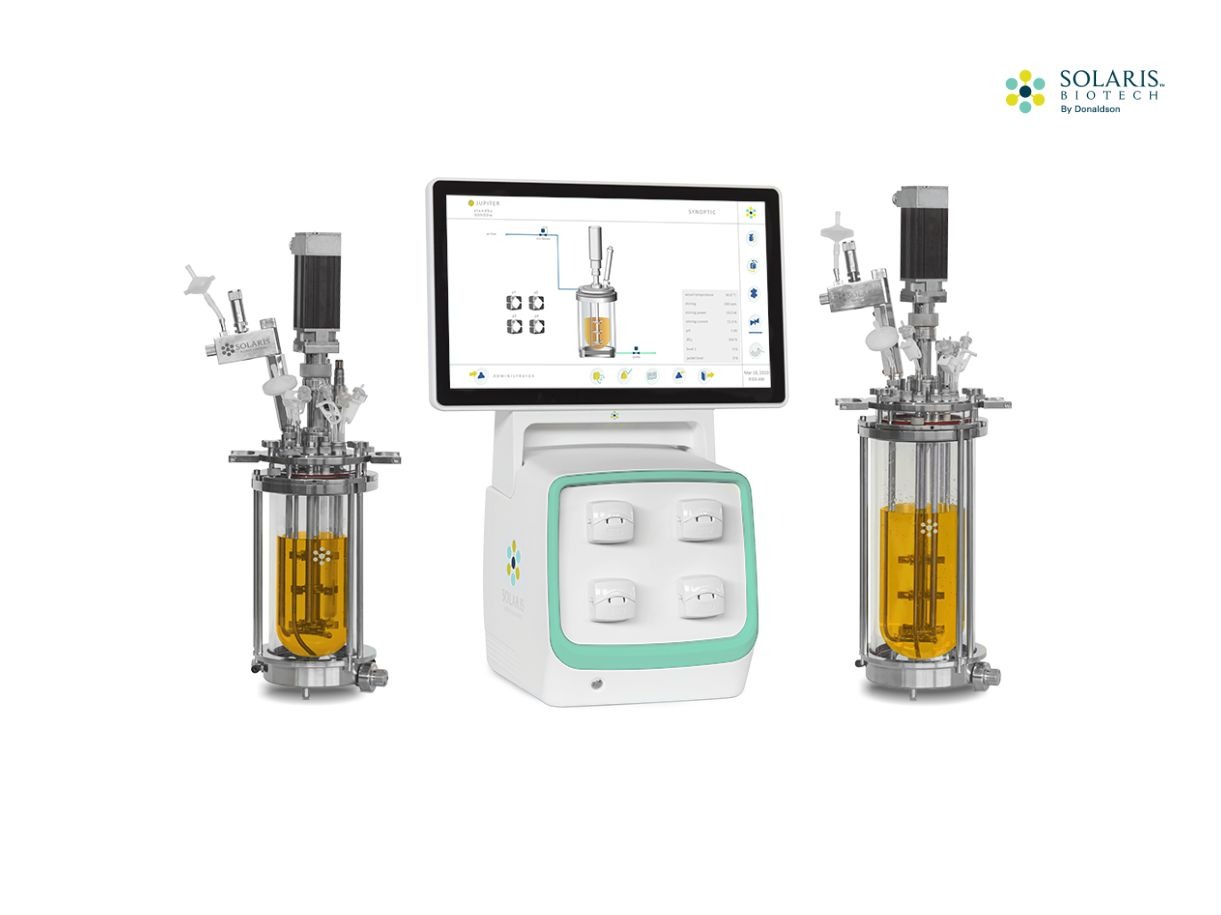
Do you have a RAYPA autoclave and want to know how to sterilize your Solaris Biotech Jupiter fermenter? Contact us and our experts will advise you on the best way to do it. We will be delighted to answer your questions about our equipment and offer our recommendations.
Autoclaves for sterilization of fermenters of certified quality
At RAYPA, we offer a wide variety of autoclaves suitable for the sterilization of fermenters, with certified quality. Our product catalog features an extensive variety of models from both the Classic Line and Top Line range. Designed for ease of use, our autoclaves feature intuitive controls and advanced safety features, enabling thorough traceability of the sterilization process.
| Reference | Usable dimensions of the chamber (Ø x H mm) |
|---|---|
| AE-50-B | 300 x 710 |
| AE-75-B | 400 x 600 |
| AE-110-B | 400 x 850 |
| AE-150-B | 500 x 760 |
| TLV-50PD | 400 x 450 |
| TLV-75PD | 400 x 650 |
| TLV-110PD | 500 x 600 |
| TLV-150PD | 500 x 850 |
Their robust construction, outstanding value and straightforward installation make them an exceptional choice for fermenter sterilization.
In addition to the variety of models, there is a wide range of accessories available to be equipped, including baskets, trays, transport trolleys and basket lifting cranes.
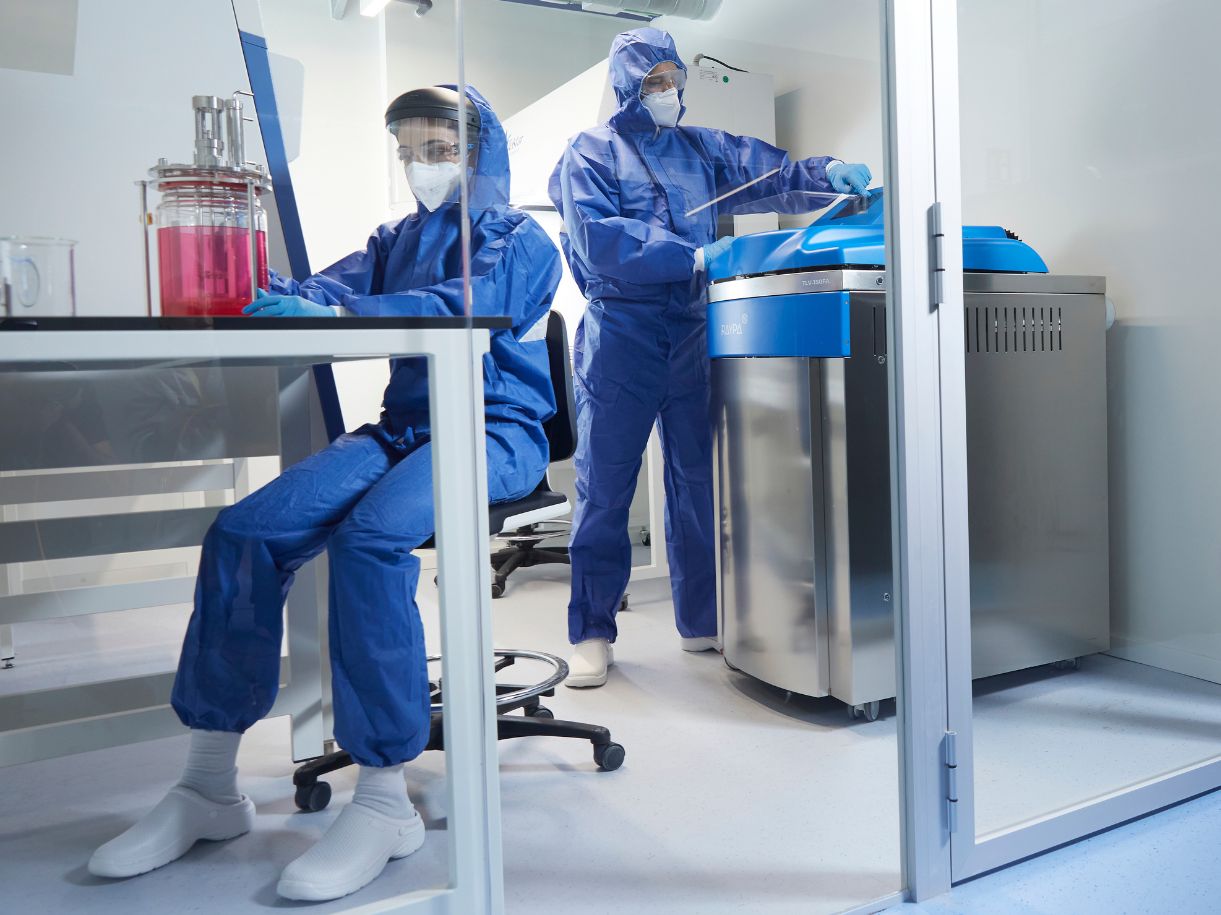
Realiability of sterilization equipment is essential for conducting successful assays and experiments within research environments, and for maintaining high-quality standards in laboratories and production areas. That is why all our autoclaves for fermenter sterilization have been designed and built entirely in our facilities in Barcelona for more than 45 years, a testimony of our quality and experience.
This equipment undergoes extensive testing to comply with regulations and standards, including the European Pressure Equipment Directive (PED). By adopting this approach, we pursue the highest levels of production excellence and ensure the safety of our products.
At RAYPA, we provide comprehensive solutions tailored to meet our customers’ sterilization requirements. With our wide selection of autoclaves and the expert advice of our team, we assist you in finding the equipment that best suits your requirements.
For more detailed and customized guidance on choosing the ideal autoclave, do not hesitate to contact our experts. Working together, we can identify and provide a solution that ensures both efficiency and safety in all your sterilization operations.
Why RAYPA?
GLOBAL REACH
With half a century of experience, we have a lengthy list of satisfied customers around the world. Currently, we export 85% of our annual turnover and have a stable network of distributors in over 100 countries.
EFFICIENT TECHNICAL SERVICE
Our team of highly qualified technicians and engineers is expert in our products. If you experience a technical issue, it will be our priority to rectify it. When you purchase a RAYPA unit, you’re guaranteed top-level support and technical assistance.
EXPERT MANUFACTURER
RAYPA is a global leader in manufacturing laboratory autoclaves. Each of our autoclaves is designed and built entirely at our facilities in Barcelona, ensuring the highest levels of production excellence.
FULL AND CUSTOMIZABLE RANGE
We offer an extensive portfolio of laboratory autoclaves to cover multiple applications and market segments. Discover the combination of autoclave model and accessories that best fits your needs within our 11 series and 35 available models.
INNOVATION AND QUALITY
Our products feature advanced technology, ongoing innovation, superior construction quality, and are designed for a long service life. Our technical and engineering staff works tirelessly every day to optimize our products and exceed our customers’ expectations.
COMPREHENSIVE CONSULTATION
Our team of specialists assesses each project and provides guidance to clients on the option that best suits their requirements. After the sale, we offer training on the use and recommended maintenance of each unit to ensure its optimal operation and extend its lifespan.

